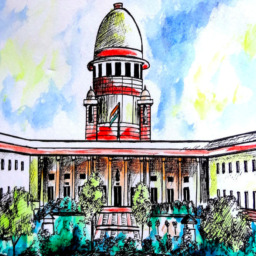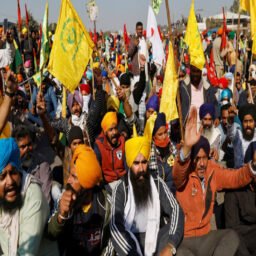
INTRODUCTION
Education is one of the most basic human rights. It is a tool to the success of the democratic system of any country.[1] Education creates awareness among people, which makes them responsible. Despite education being a fundamental right in India, many people are illiterate. Education helps in the complete development of a human being. But poverty is a hurdle that prevents people to exercise their basic educational rights in India. When the Constitution was framed provision for the right to education was provided under Article 45(DPSP) and Article 51A (Fundamental duty) means that this right was not enforceable. But over time, a need arose to shape educational right as a fundamental right in India so, 21A Article was added by the 86th Constitutional Amendment Act, 2002.
This blog discusses the evolvement of the right to education from a DPSP to a fundamental right in India.
RIGHT TO EDUCATION AND DPSP
Earlier, the right to education was under DPSP’s, and it was not a fundamental right. Because of its unenforceable nature, the right to education was limited to written texts and lacked proper implementation. Article 45 provided compulsory and free education for all until the age of fourteen years. But after the 86th Constitutional Amendment Act, 2002, the right to education was transformed into a fundamental right. The 86th Amendment Act, 2002 added article 21A in the constitution and changed the provisions of Article 45. Today Article 45 focuses only on education to children below the age of 6 years and early childhood care.
JUDICIAL INITIATIVE
CAPITATION FEE CASE
Mohini Jain v State of Karnataka & others[2]
Under this case law, A girl named Mohini Jain was offered admission to a Private Karnataka Medical College but, the fee charged was too high that her father was unable to pay the fees. On this ground, her admission to the medical college was denied. The court held that Charging high fees from students denies their right to education. Article 21 of the Indian Constitution thus, includes the right to education at all levels. But in this case, the court didn’t set up the age to which the Right to compulsory and free education was guaranteed.
Unni Krishnan J.P & Ors. v. State of Andhra Pradesh & Ors.[3]
Mohini Jain’s case was extended in this case as it was to bring more clarity to the decision taken in Mohini Jain’s case. The important issue that arose under Unni Krishnan case law was to know the scope of the educational right under Article 21 of the Indian Constitution and whether it extends to adult professional education.
This case restricted the fundamental right to education as it was held that educational rights will be available up to the age of 14 years. After 14 years the state’s obligation of providing compulsory education will depend on its economic capacity and development.
TAPAS MAJUMDAR COMMITTEE (1999)
In 1999, Tapas Majumdar Committee was set up by the NDA government. This was the committee that recommended the insertion of Article 21A in the Indian Constitution to provide Compulsory and free education up to the age of 14 years.[4]
86TH CONSTITUTIONAL AMENDMENT ACT, 2002
This Constitutional Amendment was of immense importance as it led to the insertion of Article 21A. According to this article, the government must provide free and compulsory education to children between the age of 6-14 years. This amendment led to the substitution of a new article for article 45 by adding a new provision to it that focuses on the education of children below six years of age and early childhood care. 86th Constitutional Amendment also added a clause (k) to article 51A that specifies the duty of the parents/guardians to provide education to their children between the age of 6 to 14 years.
The Right of Children to Free and Compulsory Education Act, 2009
This act was enacted to enforce the 86th Constitutional Amendment Act, 2002. This act consists of 7 chapters and 38 sections.
- AIM: The main aim of this act is to provide Compulsory and free education to children between the age of six and fourteen years.[5]
- RESERVATION IN THE ACT: This act mandated 25% of reservations for disadvantaged sections of society such as students belonging to Backward class, Schedule Castes, Scheduled Tribes, and Disabled children.
- NO DETENTION POLICY: This act prohibited the Detention and expulsion of children from schools.
*Kitty Sanil v. State of Kerala and Ors[6]: This case was filed by the mother of a minor child detained in class 6th and not promoted to class 7th. The petitioner contended that holding back her child in class 6th for not fulfilling minimum educational standards was against the Right to Education Act, 2009. The court held that a child must not be detained till the 8th class according to the 2009, Right to Education Act. So, the petitioner’s son was promoted to another 7th class.[7]
- PROHIBITS PUNISHMENT: This act prohibits physical punishment and mental harassment.
- CENTRAL AND STATE RESPONSIBILITY: Both central and state governments share financial as well as other responsibilities.[8]
- OTHER PROVISIONS: This act lays down various standards related to school infrastructure, teacher’s training and working hours, mid-day meals, School-working days, etc.
The Right of Children to Free and Compulsory Education (Amendment) Act, 2019
This act introduced amendments in the Right to Education Act, 2009. This act substituted the provision of section 16 of the 2009 act. The main action taken under the amendment act was to remove the no-detention policy. No detention policy means a child who failed in examinations would not be detained in the same class but will to promoted to another one without passing the previous one.
According to this act, if any child fails in examinations, he will be given chance for re-examinations. If a child fails in re-examinations then the child may be detained.[9]
CONCLUSION
Education plays a special role in one’s life. If a person is deprived of educational rights it means he is deprived of his basic human rights. India is a poor country in which there is a high economic divide. Here rich people live a lavish life on the other hand poor people don’t have money to buy a one-time meal. So, the government has to focus its large amount of time and money on providing free and compulsory educational rights to educate poor children. The government has introduced mid-day meal schemes to attract children to attend schools. But still, we are way back in educating our country because of high corruption and poor governmental functioning. We have reached ahead in terms of education since independence but still, there’s a lot more to achieve.
Author(s) Name: Aayushi (University Institute of Legal Studies, Panjab University Chandigarh)
Image
[1] NARENDER KUMAR, CONSTITUTIONAL LAW OF INDIA 440 (10th ed. 2020)
[2] AIR 1992 SC 1858
[3] AIR 1993 SC 2178
[4] Right to Education, Drishti IAS, https://www.drishtiias.com/to-the-points/Paper2/right-to-education. (Last visited on March 22, 2021)
[5] Right to Education, Drishti IAS, https://www.drishtiias.com/to-the-points/Paper2/right-to-education. (Last visited on March 22, 2021)
[6] AIR 2015 NOC 997(KER.)
[7] Kitty Sanil v/s State of Kerala represented by its Secretary to Government Department of General Education Thiruvananthapuram & Others, Lawyer services, https://www.lawyerservices.in/Kitty-Sanil-Versus-State-of-Kerala-represented-by-its-Secretary-To-Government-Department-of-General-Education-Thiruvananthapuram-and-Others-2015-05-25. (Last visited March 20, 2021)
[8] Right to Education, Drishti IAS, https://www.drishtiias.com/to-the-points/Paper2/right-to-education. (Last visited on March 22, 2021)
[9] (Amendment) Act, 2019,
https://www.education.gov.in/en/sites/upload_files/mhrd/files/upload_document/rte_2019.pdf. (Last visited March 23, 2021)















